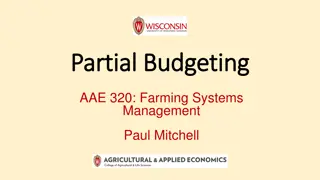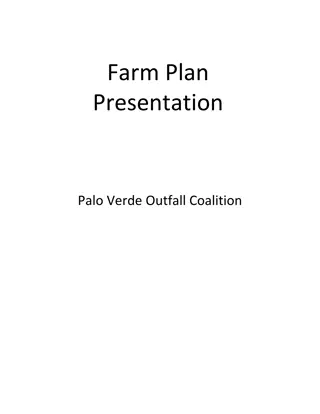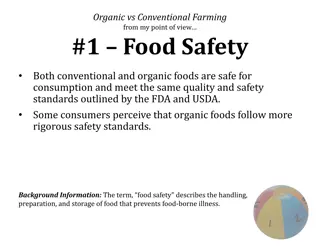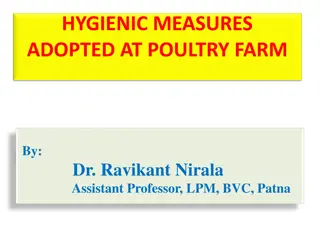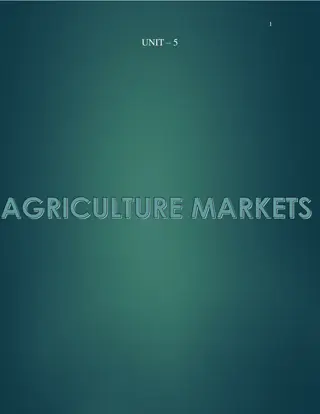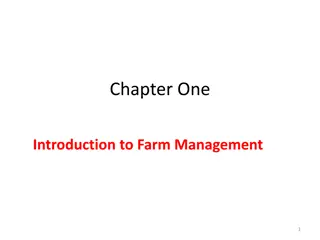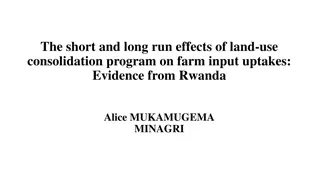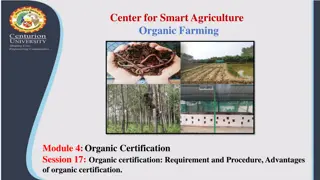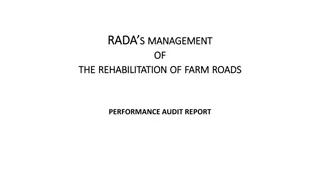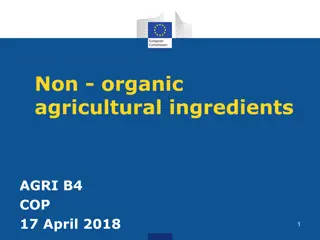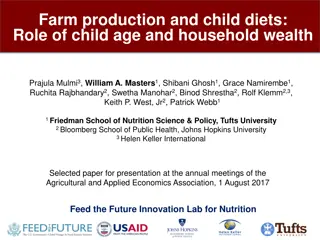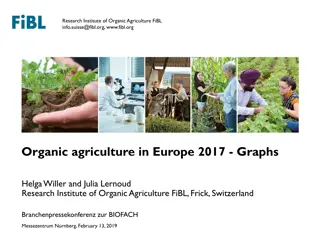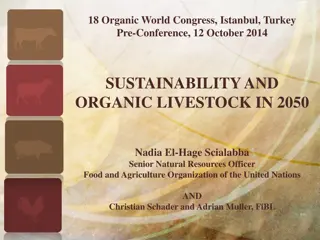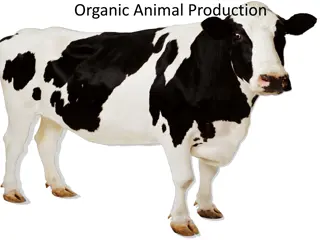
Organic Farm Business Plan Presentation by Kiran Bamanu
"Explore Kiran Bamanu's business plan for Hamro Organic Farm, focusing on organic tomato, poultry, and bee production. The farm aims to promote conscious living, agroecotourism, and organic products while providing employment opportunities and organic training. Discover the expected outcomes, activity areas, and expense analysis for this sustainable venture."
Uploaded on | 11 Views
Download Presentation

Please find below an Image/Link to download the presentation.
The content on the website is provided AS IS for your information and personal use only. It may not be sold, licensed, or shared on other websites without obtaining consent from the author. If you encounter any issues during the download, it is possible that the publisher has removed the file from their server.
You are allowed to download the files provided on this website for personal or commercial use, subject to the condition that they are used lawfully. All files are the property of their respective owners.
The content on the website is provided AS IS for your information and personal use only. It may not be sold, licensed, or shared on other websites without obtaining consent from the author.
E N D
Presentation Transcript
Presentation on Business Plan Presented By: Kiran Bamanu MSc. Ag 3rdSemester Department of Agribotany and Conservation Ecology Exam Roll No.: COE-03M-2018 Submitted Date: 31stShrawan 2078 Presented Date: 2ndBhadra 2078
Business Plan of Hamro Organic Farm For the Good Health and Conscious Living For the Good Health and Conscious Living Farm Owner: Kiran Bamanu Contact Number: 9855024158 Address: Katunje-01, Bhaktapur Date: 18th August 2021
Business Owner Address Contact Number Production within Farm Special Features Kiran Bamanu Katunje-01, Bhaktapur 9855024158 Tomato, Poultry (Layers), Bee Organic Farm Visit, Organic Training, Volunteering Service, Vermi-composting, Residential Facility 10 Ropani 3 Year Total Area Project Duration Total Cost Total Benefit BC Ratio 74,19,723 2,13,15,614 2.87
Objectives of Farm Production of fresh organic Tomato, Honey, Egg Organic Restaurant with serving Organic vegetables, fruits, poultry, mushroom, honey, fish, coffee, spices. Farm Residential for agroecotourism promotion Promotion of Organic products Organic Training Provide employment and income sources to local people
Expected Outcomes of the Project Yearly production of approximately 2000 kg of Organic Honey Yearly Production of approximately 27,500 kg of Organic Tomato Yearly Production of approximately 24,00,000 eggs 10 + family will get new income sources 5 permanent staffs and 1000 man days of seasonal labour will be employed per annum. 75 interested farmers and stakeholders will get Organic Training per year 2500+ visitors will reside in the farm house and enjoy organic food as a visitor
Activity Area proposed 1 Total area 10 Ropani 2 Vegetable Area 5 Ropani 3 Poultry Area 4 Ropani 4 Bee Area 1 Ropani 5 Training Hall 0.25 Ropani 6 Residential Area 0.5 Ropani 7 Other Area 0.25 Ropani
Expenses Analysis SN Activity Expenses 1 Tomato Production in 5 Ropani 292769 2 3 Honey Production with 50 Hives Egg Production with 1000 Leghorn birds 1353930 573024 4 Training Hall Construction 1500000 5 Organic Restaurant 1200000 6 Residential House 2500000 Total 7419723 In Words: Seventy Four Lakh Nineteen Thousand Seven Hundred Twenty Three Only
Income Analysis SN Activity Expenses 1 2 3 Tomato Production in 5 Ropani Honey Production with 50 Hives Egg Production with 1000 Leghorn birds 2250000 12185370 5730244 4 5 6 Organic Training 5 session per year for 3 year Organic Restaurant Income for 3 year Farm House Residential Income for 3 year Total 225000 750000 175000 2,13,15,614 In Words: Two Crore Thirteen Lakh Fifteen Thousand Six Hundred Fourteen Only
Financial Sustainability within 3 year Analysis Amount Total Expenses 74,19,723 Total Income 2,13,15,614 BC Ratio 2.87 Sensitivity Analysis BC Ratio If 10 % Cost is increased 2.61 If 10 % Benefit is reduced 2.59
Socio-Cultural Sustainability Organic production of crops and livestock are socially accepted in Katunje, Bhaktapur. Residing within the Farm house is cultural accepted where around 60% of people are from Newar community Establishing of Organic Restaurant and providing services with organic food and beverage is socially and culturally accepted. The farm has been planned in Katunje-01, Bhaktapur which is 2 km far from the Bhaktapur City and Madhyapur Thimi city. Being in peaceful environment and far from city area, it is socio- culturally accepted and feasible.
Environmental Sustainability The soil, climate, environment of the farm area has been studied and it is suitable for the cultivation of tomato, rearing of layer poultry and production of honey with bee hives. As the production is Organic, it helps in conversation of Environment with the principle of care, principle of fairness, principle of Ecology and principle of health. Without the use of chemicals and fertilizers, the soil quality is maintained with conservation of soil microbes. Fencing of the farm is planned with timber trees, legumes, and different fencing shrubs and trees for environmental sustainability of the farm business.
Advantages of Organic Farm No need to buy expensive chemicals and fertilizers Organic crops are structurally and also metabolically superior to other crops. Such crops are less vulnerable to rotting or molding and stored for a protracted period. Inputs costs are considerably lower compared to conventional farming. Organic Products are tastier Plant diseases, weeds and pests are naturally repelled through scientific crop rotation and other methods. Yields from the same piece of land are higher. Security of income and rich returns on investment assured.
Key Characteristics of Organic Farm Business Providing Crop Nutrients indirectly using relatively insoluble nutrient sources which are made obtainable to the plant by the action of soil micro- organisms. Nitrogen self sufficiency through the use of biological nitrogen fixation and efficient recycling of organic materials. Improving the organic contents of Soil using Poultry Manure. Nitrogen fixation in soils using legumes. Rearing of livestock, taking care of housing management, nutrition, health, rearing and breeding. Care of the larger environment and also the conversation of nature and environment.
Conclusion Hence, Hamro Organic Farm planned for establishing as a business is a sustainable business in term of Financial, Socio-cultural and environmentally. Thank you !!!


